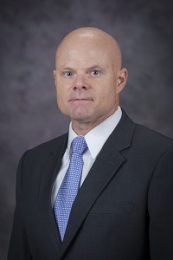 The Athletic Training Program was recently selected by the Office of Assessment for the 2017 Excellence in Assessment Citation, which highlights exemplary assessment processes and practices at K-State.
The Athletic Training Program was recently selected by the Office of Assessment for the 2017 Excellence in Assessment Citation, which highlights exemplary assessment processes and practices at K-State.
Phillip Vardiman, director of K-State’s athletic training program and associate professor in the College of Human Ecology, said the collaborative environment in the program has led to its success. “It’s definitely a team effort,” said Vardiman. “There’s not one of us that can take full credit for this type of accolade. It’s something that we’re all really proud of.”
In addition to meeting the program requirements at K-State, the athletic training program is also accredited by the Commission on Accreditation of Athletic Training Education (CAATE). According to Vardiman, this has assisted the athletic training program in honing its assessment methods. “The big piece for us that is helpful is that we’re an accredited program,” said Vardiman. “We’re utilizing best practices… and selecting some of the items we feel best represent the areas we need to quantify for the assessment program.”
The Excellence in Assessment Citation was awarded to the athletic training program for the efforts and achievements in the following areas:
- Specificity and rigor in critical thinking assessments.
- Multiple rounds of assessment that provide feedback for students and document increased levels of achievement.
- Assessment tasks that reflect authentic, real-world learning expectations.
- Clear benchmark levels of achievement that expose specific needs.
- The use of results to guide instructional enhancement.
- Well-designed assessment of academic and professional integrity.

Vardiman said these areas are met through sequential learning. Students are taught hands on athletic training skills that are then used in their clinical sites, where they are evaluated by a preceptor. This method, said Vardiman, “is a unique undergraduate experience compared to other programs on campus, providing a real world scenario where there would be actual treatment and patient care.”
The students are taught to develop a deductive reasoning thought process. Athletic training students need to be able to assess a patient’s injury and from there, determine treatment methods. “That’s a sequential learning process that we go through and we’re able to assess each component as they go through it,” said Vardiman. Students in their final year of the program are assessed globally on their ability to evaluate and treat a patient from start to finish.
Vardiman has found Canvas to be helpful for course instruction and hopes to have the entire faculty using it to link the assessment methods to grading mechanisms by the end of next year. Currently, Vardiman is working on continuing to build the athletic training program, by supporting the undergraduate degree while expanding to a graduate program.
Vardiman has received multiple awards for his work in higher education. He was recently named the 2016 Kansas Athletic Trainer of the Year by the Kansas Athletic Trainers Society (KATS), and is a previous recipient of the National Athletic Trainers Association Athletic Training Service Award. Additionally, Vardiman served as the athletic trainer with the medical team supporting U.S. track and field athletes in Rio de Janeiro during the 2016 Olympics.
The award will be presented to the athletic training program at the Institute for Student Learning Assessment in October. For more information on the athletic training program, please visit: http://www.he.k-state.edu/fndh/ugrad/athletictraining/



